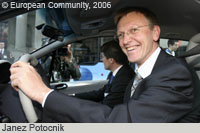Potocnik calls for more international research cooperation, especially between Europe and the US
European Science and Research Commissioner Janez Potocnik called for closer cooperation with the US in a speech to the American European Community Association round table on 7 March. In his speech, entitled 'Between cooperation and competition - science and research as a transatlantic bridge builder', the Commissioner said that the Commission is 'Working to implement a Research Framework Programme that is open to the whole world, for our mutual benefit. Quite naturally and logically the cooperation with countries that are not part of the European Union is vital for a better integration of Europe as a whole.' The recent Aho group report frequently cited the US model as one Europe should look to. Such a move would bring American researchers into Europe, and ideally benefit research and development within Europe. 'What better subject than science and research to demonstrate how closely interdependent the world's two economic giants are,' he said. The Commissioner cited the success of the international thermonuclear reactor project, ITER, as an example of how international cooperation enables very large projects to become reality. He described ITER as 'A gigantic project bringing together seven parties to develop a future sustainable energy source by developing fusion energy. ITER is a prominent example of how common challenges are of such a scale that we have no other choice than to go together.' 'Cooperation shortens the path leading from science to innovation and from knowledge to solutions in areas such as nanotech, biotech, environment, climate and cybersecurity. In all these areas, and in many more, we share information, knowledge, practices and security,' he said. The Commissioner pointed out that visa restrictions across Europe for visiting researchers would soon be harmonised. He also noted that the recent American Competitiveness Initiative announced by President George W Bush on 2 February proposed 'Immigration policies that will continue to enable the United States to attract the best and brightest scientific minds from around the world to work alongside the best and brightest American scientists.' The Commissioner did note that the trading partners are not always singing from the same song-sheet. 'Think about the scientific dimension of issues like environmental protection or climate change, that have seen Europe and the US on opposite sides on economic progress and consumer protection. Think about access to space and the development of global positioning systems. These are cases where science and politics go hand-in-hand. But they are also examples of the fact that sometimes when the politics brings us apart, then science can help us find the necessary common ground.' The Commissioner summed up by saying that 'Globalisation is of course not confined to R&D - it is also a way for companies to grow and stay competitive, which in the end will benefit Europe. For many companies today their market is neither the home market nor Europe but the whole world.'
Countries
United States



